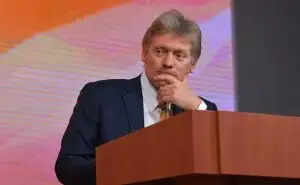Kremlin Slams US Tariff Policies: A Threat to Global Economic Stability
Kremlin's Response to US Tariff Increases

Moscow: Dmitry Peskov, the spokesperson for the Kremlin, expressed strong disapproval of the recent tariff increases implemented by the United States, claiming they threaten global economic stability.
During a press briefing on Monday, Peskov stated, “We are closely observing the current situation, which is both volatile and emotionally charged.”
He noted that the tariffs imposed by the US on various nations have fostered an environment of economic strain and negative forecasts in global markets.
Peskov assured that Russia is taking all necessary measures to mitigate the impact of this global economic instability on its own economy.
On Wednesday, US President Donald Trump enacted an executive order introducing 'reciprocal tariffs,' which includes a 10% 'minimum baseline tariff' along with increased rates for specific trading partners.
As a result of the financial upheaval triggered by the US's actions, stock markets throughout the Asia-Pacific region experienced significant declines on Monday, raising fears of a global recession.
Earlier, the Chinese Foreign Ministry condemned the unilateral 'reciprocal tariffs' imposed by the US, arguing that they strip countries, especially those in the Global South, of their developmental rights and are likely to encounter widespread international backlash.
Lin Jian, a spokesperson for the Chinese Foreign Ministry, criticized the US for prioritizing its own interests under the guise of 'reciprocity,' which undermines the legitimate benefits of other nations. This approach exemplifies unilateralism, protectionism, and economic coercion.
Lin reiterated China's firm stance against the US's misuse of tariffs, emphasizing their serious position on the matter.
According to data from the World Trade Organization, the US's tariff strategies are likely to widen the wealth gap among nations, disproportionately affecting less developed countries. This trend poses a significant challenge to achieving the United Nations' 2030 Agenda for Sustainable Development.
